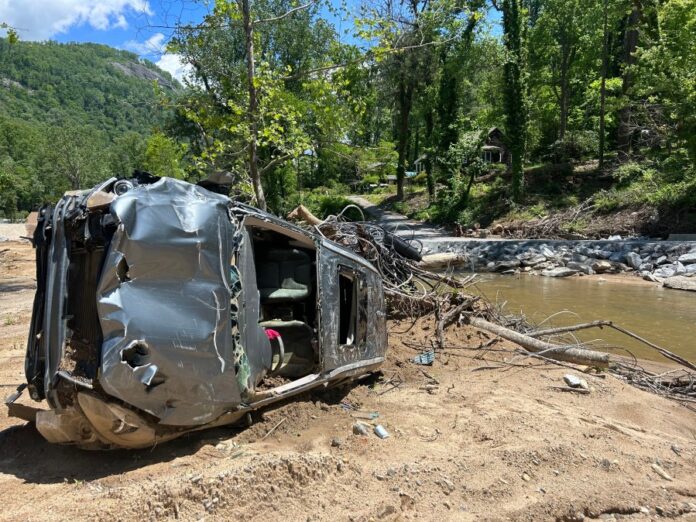
BAT CAVE, N.C. (WSPA) — Storms crossed through the region on Thursday in areas that were devastated by Hurricane Helene. As the clouds cleared, residents said the emotional storm was far from over.
When storms returned to Bat Cave, North Carolina, they brought more than just rain. Those we spoke with said it triggered painful memories, several months after Helene struck the western part of North Carolina.
The damage from the storms wasn’t much in comparison to Helene, but it did have an impact.
“There’s mud all pushed up against one side, which I think it must have been from last night. It is very scary for us,” said Helen Pace. “Also compounded with the fact that people are trying to spend money to fix driveways and put gravel in, and then all of that water comes in and washes it away. You have to figure out how you’re going to buy that all over again.”
Helen Pace is a part of WNC Moms, a local non-profit that’s been helping children and families in the area recover from Helene. She was checking for new damage when we met her on Friday.
“Last night we were awake until like 12:30,” said Pace. “The house was shaking, and just listening to it, it’s stressful. It’s very stressful for people.”
Residents said every flash of lightning, rumble of thunder, and pound of hail causes the trauma to resurface, reminding them of a storm that geographically remapped an entire region.
“All of these houses came down the mountain, and as you can see, it’s still a mess,” said Jake Jarvis, with Precision Grading that has transitioned to local disaster relief.
For North Carolina resident Jake Jarvis and his crews at Precision Grading, their restoration work started when there was no way in and no way out of many of the mountainous areas because of Hurricane Helene.
“It’s similar to when I was in the military,” said Jarvis. “It’s just a similar effort. You know, you just go out every day and you do what you can to help people.”
Hurricane Helene dropped historic rainfall, caused catastrophic flooding, and contributed to more than 2,000 landslides in September 2024.
“It started out as access and recovery. When I came here, this bridge next to us was the only way in and out of here. And it was not by vehicle. It was by a helicopter. There were no roads to this spot where we are, to the fire department, nothing whatsoever; even with a four-wheeler, dirt bike, nothing,” Jarvis explained.
As progress is made, rain from time to time puts a damper on restoration. Residents said the emotional toll stretches far beyond the piles of debris.
“I know that people here do not have the emotional bandwidth at this point to handle even one more thing. Like our plates are full, we’re exhausted,” said Pace.
“It’s really difficult. It’s difficult to see so many people in this area who are still almost in the same position that they were the week after the storm,” she added.
“All of the needs are very real. We’re still dealing with day-one issues. You know, it’s like things over there look like it did the day after the storm. I mean, it’s just houses on top of each other,” said Jarvis.
People of all ages, including Jarvis and his 9-year-old daughter, are still struggling with the psychological impact of Helene.
“And even in her nighttime prayers, you know, she prays for the storms and for everybody down here,” Jarvis said. “There’s just — I mean, maybe a simple thunderstorm, but, you know, with what they went through, what we all went through here in the area, it’s nothing anybody has ever experienced that is alive here.”
“We’re so far from normal. There’s no normal anymore. People here will never be back to normal because the damage is so severe, both physically, emotionally, and financially,” said Pace.
While the cleanup continues, so does the emotional recovery. The community said they’re moving forward with the help of each other, one day at a time.
Many of the local businesses and non-profits that are helping people in the region, like Precision Grading, said they are doing it at little or no cost. But many said their funds are dwindling. Jarvis with Precision Grading said they’re paying out of pocket to fix their heavy machinery and oftentimes purchase gravel for areas that still have yet to be worked on. WNC Moms said they have received grant funding to support restoration, but with so many people and places still needing help, the aid isn’t enough to meet the demand.



